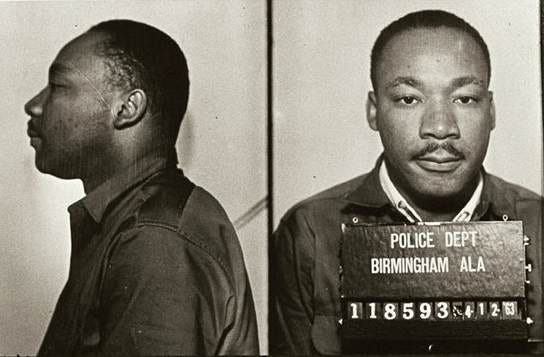Hi! I compiled this thing about time for you.

Hey there! If I sent you this link, it is because I want to share with you something that changed my life. It comes from Martin Luther King Jr.’s “Letter from a Birmingham Jail.” He was in jail because of a bunch of super-racist white a-holes who loved oppressing Black people. While he was there, he got mail from some other white people, white liberals and white moderates who said they agreed segregation was wrong and that Black people should be treated equally, but they wanted to offer King some advice on his tactics. Tactics that were less confrontational, less demanding, more gradual, more patient.
There’s a lot of great stuff in this letter, and you can read the whole thing here. What I picked out below is King directly responding to the “not the right time” idea. It’s super-helpful, or at least it was for me. The part about time being neutral? Blew my mind! Still does.
I must make two honest confessions to you, my Christian and Jewish brothers. First, I must confess that over the past few years I have been gravely disappointed with the white moderate. I have almost reached the regrettable conclusion that the Negro’s great stumbling block in his stride toward freedom is not the White Citizen’s Counciler or the Ku Klux Klanner, but the white moderate, who is more devoted to “order” than to justice; who prefers a negative peace which is the absence of tension to a positive peace which is the presence of justice; who constantly says: “I agree with you in the goal you seek, but I cannot agree with your methods of direct action”; who paternalistically believes he can set the timetable for another man’s freedom; who lives by a mythical concept of time and who constantly advises the Negro to wait for a “more convenient season.” Shallow understanding from people of good will is more frustrating than absolute misunderstanding from people of ill will. Lukewarm acceptance is much more bewildering than outright rejection.
…
I had also hoped that the white moderate would reject the myth concerning time in relation to the struggle for freedom. I have just received a letter from a white brother in Texas. He writes: “All Christians know that the colored people will receive equal rights eventually, but it is possible that you are in too great a religious hurry. It has taken Christianity almost two thousand years to accomplish what it has. The teachings of Christ take time to come to earth.” Such an attitude stems from a tragic misconception of time, from the strangely irrational notion that there is something in the very flow of time that will inevitably cure all ills. Actually, time itself is neutral; it can be used either destructively or constructively. More and more I feel that the people of ill will have used time much more effectively than have the people of good will. We will have to repent in this generation not merely for the hateful words and actions of the bad people but for the appalling silence of the good people. Human progress never rolls in on wheels of inevitability; it comes through the tireless efforts of men willing to be co workers with God, and without this hard work, time itself becomes an ally of the forces of social stagnation. We must use time creatively, in the knowledge that the time is always ripe to do right. Now is the time to make real the promise of democracy and transform our pending national elegy into a creative psalm of brotherhood. Now is the time to lift our national policy from the quicksand of racial injustice to the solid rock of human dignity.
…
I had hoped that the white moderate would see this need [for confrontational, “extremist” tactics]. Perhaps I was too optimistic; perhaps I expected too much. I suppose I should have realized that few members of the oppressor race can understand the deep groans and passionate yearnings of the oppressed race, and still fewer have the vision to see that injustice must be rooted out by strong, persistent and determined action. I am thankful, however, that some of our white brothers in the South have grasped the meaning of this social revolution and committed themselves to it. They are still all too few in quantity, but they are big in quality. Some — such as Ralph McGill, Lillian Smith, Harry Golden, James McBride Dabbs, Ann Braden and Sarah Patton Boyle — have written about our struggle in eloquent and prophetic terms. Others have marched with us down nameless streets of the South. They have languished in filthy, roach-infested jails, suffering the abuse and brutality of policemen who view them as “dirty nigger-lovers.” Unlike so many of their moderate brothers and sisters, they have recognized the urgency of the moment and sensed the need for powerful “action” antidotes to combat the disease of segregation.
If you want to learn more about the white allies King cited above, here are some links.
Ralph McGill — former editor of the Atlanta Constitution newspaper
Lillian Smith — writer and social critic
Harry Golden — union organizer, writer and editor of the Carolina Israelite
James McBride Dabbs — writer, theologian and farmer
Ann Braden — writer and editor of The Southern Patriot
Sarah Patton Boyle — author and desegregation activist
Thank you for taking the time to read this,
Gillian Brockell


